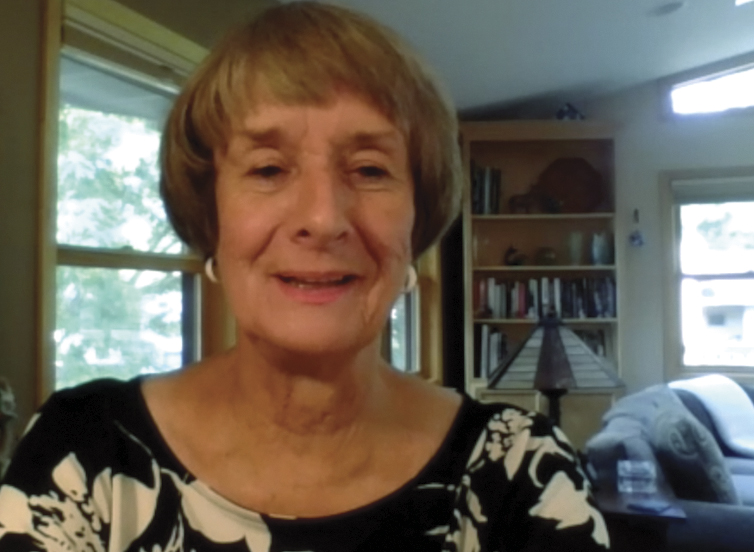[ad_1]
This ongoing series of conversations with Minnesota women about their engagement in politics was created as a collaboration between Amra Avdic, journalist and project director of the Contemporary Women’s Festival in Bosnia, and Minnesota Women’s Press, thanks to support from the global Community Solutions Program in Fall 2021.
Amra interviewed Minnesota women engaged with politics to share conversations with her television audience in Bosnia about how to engage and support women candidates and voters in what has been perceived as a patriarchal society.
Can you tell me how your story began, that led you to become a politician in the Minnesota House of Representatives?
I joined a group that is called the League of Women Voters in the United States. It started after women got the right to vote with the 19th amendment. They wanted to educate women on the issues. So I joined that group here in my local area, and got interested in attending political meetings, school board, city council, state legislature, and then I was recruited by one of my friends in the League of Women Voters who was on the local school board. I did that for a couple of terms. Then, I was recruited to the state legislature. When I got involved, I always was careful to recruit other women, realizing that often men come forward for political office, and women are more reticent. I never would have gotten into politics without the League of Women Voters and strong women pushing me forward. I try to do that for other women as well.
You have said earlier that it’s important to give women more encouragement to run. What in your experience has been proven to be an effective way of encouraging women to run?
Women don’t like to do things by themselves. They need lots of people supporting them and lots of help. So I actually gave this advice to men and women who I was recruiting, but women are the ones who actually often did it. Don’t decide to run until you have your helpers. You need a treasurer or someone to collect up the money and put it in the bank and get the thank yous ready. You need a volunteer coordinator who will recruit people to go door knocking with you who will help. You need someone to head up doing your social media. I tell women to do that. They feel comforted and empowered, and that they’re not alone in the race, because races can be tough, especially nowadays with all the negative campaigning.
Usually I see women who are always thinking about whether they’re ready to go into politics. Are we ever ready or should we be bold, and just try even if we don’t think that we have everything prepared?
Just jump in. Because we’re never ready. You’re right. We’re always learning if we’re lucky; we’re lifelong learners, I’m always reading books and listening to documentaries, or podcasts and things. We are never done learning. The best place to learn is being in elected office. So when you’re on the school board, you can talk every day if you want to the school superintendent. If there’s an issue coming up about how to manage bussing, and getting kids to and from school, or what’s the best curriculum for reading or math, you have people right there to ask in your school district. I came from the League of Women Voters, as I said, where we studied issues to death, because we just thought we always needed to know more. But yet, when I ran for the legislature, everybody said, Forget about the issues, you know, just get in there.
In my country, it’s so discouraging that even women don’t want to vote for a woman because under the pretext that men are longer in politics, they know better, etc, etc. But how can we change the deeply rooted attitudes? What can we do to change those things?
I think success breeds success. Those of us who do support more women in office need to keep doing that and keep putting them forward. They just have to be encouraged and be bold, as you said, to put their hat in the ring and run, and then they will win. It’s when they don’t run that we don’t have the numbers of women in office that we should; the higher up the food chain we go, the more criticism. We think governors and presidents and people that are in high level positions need to be really strong and that it’s really good to have a male voice and a strong man or something like that. So those are the places where it’s even harder to get women to run or to succeed. We know women study and work hard, and by and large, you know, do really well. So I think more role models.
What are you still working to achieve through a political game engagement? How challenging was it to fully expose your throat? How did you deal with your private but also a public situation at the same time?
That was a luxury for me to be a legislator when Jim got sick. He was 21 and I had been in the legislature for six years. I was already a public figure, both our kids and my husband. It was a natural progression, then when Jim got sick, for me to keep talking about our family. When the newspapers, television, and radio find out a legislator has a personal story, that’s a good story for them; they might not cover the issue at all, especially something like mental illness back when Jim got sick in 1999. When it’s a public elected official, then you have an opportunity and an obligation to share. Even though it was very hard, because you’re in personal distress, it still was a luxury. Every time our family ran into trouble, like the hospital wouldn’t talk to us because they didn’t ask him about a medical release for information, or the police wouldn’t take him to the hospital, even though he was very sick and out of control, I could make a big fuss. They didn’t want to be the one that didn’t properly take care of Representative Greiling’s son. That gave me power and I felt I should use it for other people.
The first legislation I ever passed was the first problem we ran into; they wouldn’t talk to me because Jim hadn’t signed a release of information. In truth, they hadn’t asked him to sign one. They didn’t think it was their job to ask him because he was in quite a bit of distress and psychotic when he went to the hospital, but they didn’t ask him and they didn’t tell me. I looked into it with the lawyers at the legislature. We just wrote a simple bill that said hospitals have to explain to families about the need for signing releases. I thought that was just common sense. That is often what policy is, there is just common sense written down that people aren’t using their common sense about. So all things like that. It also made me feel better.
I have to know after 20 years of legislature, what are the results that make you most proud?
I would have been mostly proud of this huge education finance reform that I developed working with all the education groups in the state and they all eventually agreed upon it. We have different areas of the state that need different types of funding, and they always fought amongst each other, but then we had this plan that would have been fair to everybody. That would have been my crowning achievement. We didn’t get it passed in the end. We passed it in the House of Representatives where I served, and I think the governor would have signed it. But the Senate rural Democrats, actually my own party, killed it, because they were fearful that they were doing better under the old system, where they’ve been able to advocate for certain special things in the Education Finance bill. So that didn’t end up passing. That was my biggest regret.
What I’m most proud of is my mental health legislation. We did end up with a huge, better funded mental health system, a much more robust amount of services and did a lot of policy improvements. I think that is what I’m most remembered for, even though I spent most of my time working on education.
How does everyday life, being a wife, sister, mother, daughter, play an important role in political action? How do you see that?
Well, I think that women are good at multitasking. So I think it’s a natural thing. We can weave everything in. I just think it enhances all the relationships in your life. You don’t have as much time, but my family’s always been proud of me. Our daughter, like you, is a journalist, and she got interested in public policy, but was smart enough not to get into the fray herself. She works for POLITICO, if you’re familiar with that organization.
Jim, our son, helped me write the book. A lot of parents that I know would like to write about their children with schizophrenia or some sort of mental illness, but the family member doesn’t want them to. They’ve gotten used to this culture of keeping it quiet, that it’s a shameful thing. It just kind of compounds your sadness and your grief. So everybody benefits when you talk publicly and me, am always talking publicly, helped my family and helped me to write the book can help my son to participate.
Did you know?
Drug Deaths: 1,286 people died of accidental overdoses in Minnesota in 2021 — a 22 percent increase from 2020. Most of these are related to fentanyl. Said Minnesota Commissioner of Health Jan Malcolm. “One important step is to expand programs that make it easier for people to access naloxone — a medication that can reverse overdoses and save lives.”
[ad_2]
Source link



